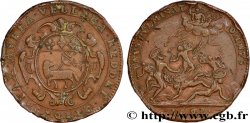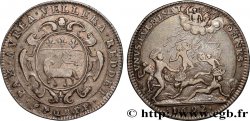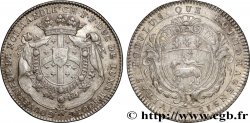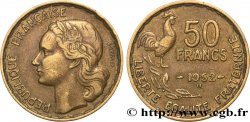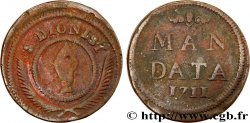fjt_290016 - ROUEN (VILLE DE...) Jeton Ar 29, Louis XIV 1668
Nicht verfügbar.
Artikel auf unserem Online-Shop verkauft (2014)
Preis : 190.00 €
Artikel auf unserem Online-Shop verkauft (2014)
Preis : 190.00 €
Type : Jeton Ar 29, Louis XIV
Datum: 1668
Metall : Silber
Durchmesser : 29 mm
Stempelstellung : 6 h.
Rand lisse
Seltenheitsgrad : R2
Kommentare zum Erhaltungszustand:
Usure régulière sur les reliefs. Très bel exemplaire avec une jolie patine de collection
N° im Nachschlagewerk :
Vorderseite
Titulatur der Vorderseite * CIVITAS * ROTHOMAGENSIS.
Beschreibung Vorderseite Écu rond de Rouen dans une couronne formée de deux palmes.
Übersetzung der Vorderseite (Ville de Rouen).
Rückseite
Titulatur der Rückseite VT * CÆSAR * VINCIT * EVNDO * ; À L’EXERGUE : *1668*.
Beschreibung Rückseite Le roi à cheval, s'élançant au galop, sur fond d'une armée de fantassins-piquiers et de pièces d'artillerie.
Übersetzung der Rückseite (Comme César, il triomphe en s'élançant).
Kommentare
Ce type est absent du Feuardent. Le revers rappelle qu’en 1667 a débuté la guerre de Dévolution contre l’Espagne. Le droit de dévolution en usage dans les Pays-Bas donnait la propriété des biens aux enfants du premier mariage. Charles II était du second lit de Philippe IV mais Marie-Thérèse du premier lit. Louis XIV réclama donc une partie des Pays-Bas espagnols au nom de son épouse. Cette guerre conclue par la paix d’Aix-la-Chapelle permit d’obtenir divers territoires en Hainaut et Flandre (notamment Lille).
This type is absent from the Feuardent. The reverse recalls that in 1667 the War of Devolution against Spain began. The right of devolution in use in the Netherlands gave ownership of property to the children of the first marriage. Charles II was from the second marriage of Philip IV but Maria Theresa from the first marriage. Louis XIV therefore claimed part of the Spanish Netherlands in the name of his wife. This war, concluded by the Peace of Aix-la-Chapelle, made it possible to obtain various territories in Hainaut and Flanders (notably Lille).
This type is absent from the Feuardent. The reverse recalls that in 1667 the War of Devolution against Spain began. The right of devolution in use in the Netherlands gave ownership of property to the children of the first marriage. Charles II was from the second marriage of Philip IV but Maria Theresa from the first marriage. Louis XIV therefore claimed part of the Spanish Netherlands in the name of his wife. This war, concluded by the Peace of Aix-la-Chapelle, made it possible to obtain various territories in Hainaut and Flanders (notably Lille).








 Berichten über einen Fehler
Berichten über einen Fehler Die Seite drucken
Die Seite drucken Teilen meiner Auswahl
Teilen meiner Auswahl Stellen Sie eine Frage
Stellen Sie eine Frage Einlieferung/Verkauf
Einlieferung/Verkauf
 Details
Details